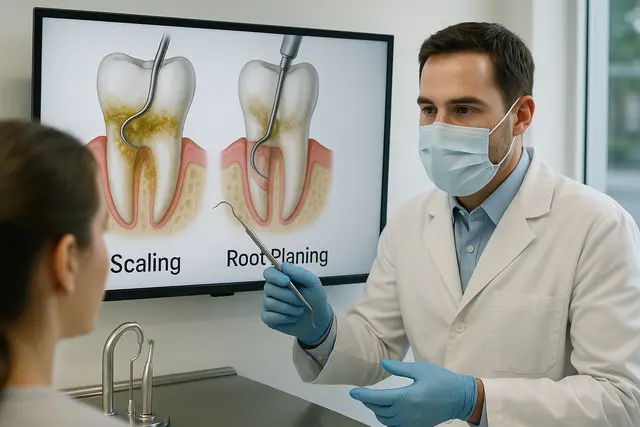General Dentistry
6 min read
Jun 01, 2025
What Are the Different Types of Dental Appointments? Full List Inside
Not all dental visits are the same, and if you’ve ever wondered why one appointment is a quick cleaning while another involves x-rays, numbing gel, and mysterious tools, you’re not alone. Understanding the different types of dental appointments can help you take better care of your teeth, ask the right questions, and feel more in control of your oral health.

Nobody loves going to the dentist. But like oil changes for your car or watering your plants, dental appointments are a non-negotiable part of keeping things running smoothly. And knowing what to expect (or what to ask for) can actually make it easier to take good care of your teeth and gums.
Whether you’re dealing with a stubborn toothache, trying to prevent gum disease, or just due for a routine dental cleaning, understanding the different types of dental appointments can save you stress, and maybe even save your smile.
Here’s a full list of dental appointments, what they involve, and why your dentist may recommend them.
Dental Cleaning: The Basics of a Healthy Mouth
Routine dental cleanings are the bread and butter of general dentistry. Most people should schedule a dental cleaning every six months, and your dentist might recommend more frequent visits if you’ve had gum disease or other dental issues in the past.
A dental hygienist will clean your teeth and gums, removing plaque and tartar that brushing alone can’t handle. Think of it as a refresh button for your mouth. Not only does it keep your teeth and gums healthy, but it also gives your dentist a chance to catch early signs of trouble.
Dental Checkup: More Than Just a Quick Look
A dental checkup often happens alongside your cleaning, but it’s more than a glance and a pat on the back. Your general dentist will examine your teeth, gums, jaw, and tongue for signs of decay, gum disease, or abnormalities. They may take dental x-rays to spot hidden issues, especially if you haven’t had them done in a while.
This visit is your chance to ask questions about your oral health, your dental habits, or any tooth that’s been bugging you. A good dental checkup helps your dentist build a treatment plan tailored to your needs.
Types of General Dentistry: Prevention, Restoration, and Education
General dentistry covers everything from preventive care to fixing broken teeth. The types of general dentistry services include exams, dental cleanings, fillings, crowns, bridges, and more. It’s what you get at your everyday general dentistry office, the one-stop shop for keeping your teeth and gums healthy.
Common general dentistry appointments include diagnosing dental conditions, discussing treatment options, and getting advice on oral hygiene routines that actually work for your life.
Root Canal: Saving a Tooth That’s Crying for Help
If you’ve ever felt a toothache that kept you up at night, you know something’s not right. When tooth decay or infection reaches the pulp of the tooth, a root canal may be your best option to save it.
Despite the scary reputation, root canals aren’t the horror story they used to be. Your dentist will remove the infected tissue, clean the area, and seal the tooth. It’s often followed by a dental crown to protect the repaired tooth. Many dental procedures include root canals as part of emergency or restorative care.
Crowns, Bridges, and Veneers: Cosmetic Meets Function
When a tooth is too damaged for a simple filling, a dental crown might be the answer. Crowns cover and protect damaged teeth, restoring function while keeping your bite in line.
For those with a gap between missing teeth, a dental bridge can help restore your smile and make chewing feel normal again. Bridges are anchored to natural teeth or implants.
Looking for a cosmetic fix? Dental veneers are ultra-thin shells placed over the front of your teeth to improve shape, color, or spacing. Veneers are great if you want a natural look without full tooth replacements.
Dentures and Implants: Replacing Missing Teeth
Tooth loss happens, and thankfully, dentistry has a lot of solutions. Traditional dentures are removable prosthetics that replace missing teeth and restore your smile. For something more permanent and secure, dental implants are the gold standard.
An implant is a titanium post placed in the jawbone that fuses with the bone, acting like your natural tooth root. Over time, an artificial tooth is attached, looking and functioning like the real thing. Implants help preserve jawbone health and support facial structure. They’re one of the most advanced dental treatments out there for long-term tooth replacement.
Scaling and Root Planing: Deep Clean for Troubled Gums
If your gums are red, swollen, or bleed when brushing, you may have early signs of gum disease. Scaling and root planing is a deeper clean that goes below the gum line to remove hardened plaque and tartar (yep, that stuff that forms on the teeth even with good brushing).
This type of dental cleaning helps stop gum disease from progressing, allowing your gums to heal and reattach to your teeth. If you’ve been skipping regular teeth cleanings, your dentist might recommend this to get things back on track.
Teeth Whitening: Brighten Up Safely
Whitening toothpaste and strips might help a little, but in-office teeth whitening treatments deliver real, noticeable results. These procedures are fast, safe, and more effective than anything you’ll find at the drugstore.
A dentist will take care to protect your gums and apply a whitening agent to remove years of staining. Whether you’ve got a wedding, interview, or just want to love your smile again, teeth whitening is a common dental appointment that packs a punch.
Dental X-rays: Behind-the-Scenes Essentials
Dental x-rays aren’t a separate appointment type, but they’re an important part of most dental checkups. They allow your dentist to see what’s going on inside the teeth and below the gum line, areas that can’t be seen during a visual exam.
X-rays help catch cavities, infections, impacted teeth, and even bone loss from gum disease. They’re safe, quick, and essential for early detection.
Dental Bonding and Minor Fixes
Have a chipped tooth or a small gap that bugs you? Dental bonding is a quick and affordable fix. Your dentist applies a tooth-colored resin to the damaged teeth, shapes it to match, and hardens it with a light.
It’s often done in one visit, requires no anesthesia, and works great for small imperfections that don’t need more involved dental procedures like veneers or crowns.
Orthodontic Treatment: Braces Aren’t Just for Teens
If your teeth are crowded, gapped, or bite alignment is off, orthodontic treatment might be recommended. While you might think braces are for kids, more adults are straightening their smiles than ever before.
Today’s options include traditional metal braces, clear ceramic braces, and invisible aligners like Invisalign. Not only does this improve the look of your teeth, but it also makes them easier to clean, meaning better long-term oral health.
Emergency Dental Visits: When You Just Can’t Wait
Sometimes you can’t wait to schedule a general appointment. Whether it’s a knocked-out tooth, a severe toothache, or a broken crown, emergency dental services are available for urgent care.
Call your dental practice immediately if something feels wrong. Quick action can often save a tooth and prevent further complications.
Preventive Visits and Education: Build Good Dental Habits Early
General dentists aren’t just there to fix problems, they’re your partners in prevention. Many general dentistry services include tips for building better habits, choosing the right toothbrush, or adjusting your flossing technique.
These regular dental visits are key to long-term oral health. Teaching kids early to take good care of their teeth builds habits that last a lifetime.
Ready to Take the Next Step?
Whether you're overdue for a dental checkup, wondering if that aching tooth needs a root canal, or ready to explore veneers, the best way to start is by talking with your dentist. A quick visit to the dentist could make all the difference for the health of your teeth and mouth.
Don’t wait for pain or discomfort to force your hand, schedule an appointment, ask questions, and take control of your oral health. If you're not sure where to start, just request an appointment and let your general dentist guide you toward the right care.
Taking good care of your teeth isn’t just about avoiding cavities. It’s about keeping your smile strong, your gums happy, and your confidence intact.
And hey, who doesn’t love the fresh, squeaky-clean feel after a good dental cleaning?
What Are the Most Common Types of Dental Appointments?
The most common dental appointments include routine cleanings, dental checkups, and restorative treatments like fillings and crowns. Other frequent visits may involve teeth whitening, dental x-rays, or orthodontic consultations. Each type plays a unique role in maintaining or improving oral health.
How Often Should I Schedule a Dental Cleaning?
Most people should schedule a dental cleaning every six months. However, if you have a history of gum disease or other dental concerns, your dentist may recommend more frequent visits to keep plaque and tartar under control and monitor your oral health closely.
What Is the Difference Between a Dental Checkup and a Cleaning?
A dental cleaning focuses on removing plaque and tartar buildup to prevent gum disease, while a dental checkup involves a full oral exam. During the checkup, your dentist looks for signs of decay, infection, and other issues, and may take x-rays to evaluate areas not visible during the cleaning.
When Should I See a Dentist for an Emergency?
You should schedule an emergency dental visit if you experience severe tooth pain, a knocked-out tooth, a broken crown or filling, or swelling in your mouth. Prompt care can prevent complications and often save the tooth, so don’t delay contacting your dentist if something feels urgent.
Read Next
Related Posts

General Dentistry
How to Stop Nerve Pain in Tooth: Fast Relief That Works
Tooth nerve pain can be one of the most intense and disruptive types of discomfort. It often strikes without warning and makes everyday activities like eating, drinking, or even talking feel unbearable. Understanding what causes this pain and how to manage it effectively is key to getting fast relief.
4 min read
Sep 15, 2025

General Dentistry
Can a Sinus Infection Make Your Jaw Hurt? Understanding the Connection
Jaw pain can be unsettling, especially when it seems to appear out of nowhere alongside a stuffy nose or headache. Many people are surprised to learn that sinus infections can cause discomfort that feels like it’s coming from the jaw. Understanding the connection between your sinuses and jaw pain is key to getting the right treatment.
5 min read
Sep 15, 2025

General Dentistry
What Is SRP in Dentistry? A Complete Guide to Scaling and Root Planing
When it comes to dental health, most people think regular cleanings are enough to keep their smile safe. But sometimes, what’s happening below the gumline needs more attention. Scaling and root planing (SRP) is a treatment designed to address gum disease at its source, protecting both your gums and teeth from long-term damage.
5 min read
Sep 10, 2025
Don’t have time to research every dentist around you?
See why 30k+ patients trusted us